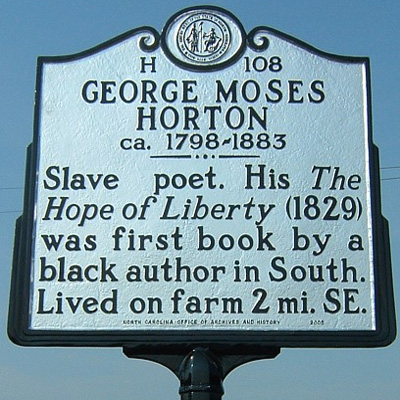
George Moses Horton Historical Marker, Pittsboro
State historical marker to George Moses Horton, a black poet and slave.
H 108 / GEORGE MOSES HORTON / ca. 1798 - 1883 / Slave poet. His The / Hope of Liberty (1829) / was first book by a / black author in South. / Lived on farm 2 mi. SE.
North Carolina Department of Cultural Resources
1999
35.793630 , -79.099830
View in Geobrowse
"George Moses Horton Marker H 108," Waymarking.com, (accessed June 17, 2014) Link
"George Moses Horton," North Carolina Literary Hall of Fame, (accessed June 17, 2014) Link
Cobb, Collier. "An American Man of Letters," (Chapel Hill, NC: University of North Carolina, 1909), (accessed May 29, 2012) Link
North Carolina Department of Cultural Resources. "George Moses Horton," North Carolina Highway Historical Marker Program, http://www.ncmarkers.com, (accessed May 29, 2012) Link
Walser, Richard, 1988. "Horton, George Moses," NCpedia.org (accessed November 1, 2014) Link
Walser, Richard. "George Moses Horton, 1798?-ca.1880," Documenting the American South (from Dictionary of North Carolina Biography edited by William S. Powell), (accessed June 17, 2014) Link
Yes
George Moses Horton (ca. 1798 - 1883239), the first African-American to publish a book in South, was eager to learn to read from an early age. He was entirely self-taught, and he taught his brother to read as well. He composed poetry in his head and memorized his compositions to recite and dictate to others who could write them down. His poetry included acrostic poems, which he sold to students at the University of North Carolina, as well as protests against the institution of slavery. Caroline Hentz, a faculty wife, assisted him in transcribing his poems, and in 1829 Raleigh printer Joseph Gales published his first book, The Hope of Liberty.
Horton's family was fragmented multiple times throughout his life. He attempted unsuccessfully to gain his freedom, with sponsors at the University even offering $100 above the asking price. Nor did the publication of his books raise enough money to purchase his freedom. In 1865, Horton was finally achieved freedom under the protection of the Union troops stationed nearby..
In 1978, Governor Jim Hunt declared June 28 as George Moses Horton Day.
In 1996, Horton was among the fifteen inaugural inductees into the North Carolina Literary Hall of Fame.
In 1999, the North Carolina Division of Archives and History approved placement of a historic marker, the first for an African American in Chatham County.
Horton was born in Northampton County, near the Virginia border. His owner moved him, his mother, and his younger sisters to Chatham County when he was about three years old. In 2000, the Chatham County Arts Council, in partnership with Horton Middle School and the Chatham County Black Historical Society, sponsored a series of educational and public events to celebrate the 200th anniversary of George Moses Horton entering Chatham County.
The marker is on Highway 15-501 near Mt. Gilead Church Road in Chatham County.
The surrounding landscape is flat and mostly undeveloped. There are grassy open spaces with stands of pine forest set back from the highway.
 Know anything else about this monument that isn't mentioned here? If you have additional information on
this or any other monument in our collection fill out the form at the Contact Us link in the footer. Thank you.
Know anything else about this monument that isn't mentioned here? If you have additional information on
this or any other monument in our collection fill out the form at the Contact Us link in the footer. Thank you.

